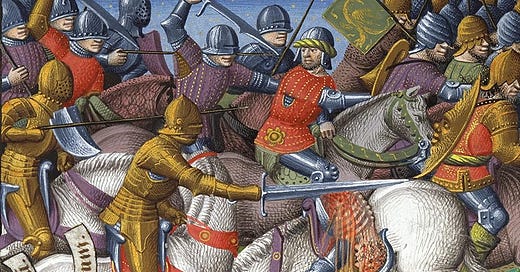If you are looking for the beginning of the study for The Song of Roland then you can go HERE for a brief introduction. At the bottom of the introduction you will find the links to each section of the study guide as it becomes available. If you would like to see the growing list of book studies available for free on this site you can go HERE. Enjoy!
Virtues/Vices/Great Ideas: (Find them in the Text)
Justice, Faith, Hope, Vengeance, Fantasy, Friendship
Grammar Questions: (The Information of the Text)
What reply did Ganelon give when Charlemayn said “I hear the horn of Roland cry”?
To whom did Charlemayn give the charge of guarding Ganelon as prisoner, and what did they do with him?
What do the French soldiers do, and how do they behave, once they realize Roland has called for help?
What kind of behavior did the Archbishop say “becomes a knight of breed”?
How many French soldiers remain at Roland’s side now that he has blown his horn?
What occurs among the French soldiers “when it is known no prisoners will be made”?
What happens to Marsile when he goes head to head against Roland?
How many men did the Paynim Marganice have in his command and where were they from?
Who severely wounded Oliver and what became of that man?
What did Oliver unintentionally do because he was losing his sight?
What did Oliver do as his last act before he died?
Logic Questions: (Interpreting, Comparing/Contrasting, Reasoning)
Why did Ganelon remind Charlemayn that Roland “took Noples against [his] orders”?
What did Naimon mean when he said, “He that would stay you is but a traitor fell”?
The text says, “when on this field Carlon my lord sets his eyes he’ll see what toll we’ve taken on their might.” Why is Roland concerned about what Carlon (Charlemayn) will see when he arrives?
Why did Oliver say, “Sir, my companion, draw nigh and stand with me” when just moments ago he was very angry with Roland?
What did Oliver mean when he said, “The devil take the hindmost”?
What does Oliver’s final prayer reveal about the kind of person he is?
Rhetoric Questions: (The Analysis of Ideas in the Text)
Do you think the treatment of Ganelon, after being arrested, was just? Why or why not?
The poet said, “their prayers are empty…they cannot come in time.” Do you believe prayer can change the way things are? If so, how so? If not, why not? Can prayers change the past or only things in the present and future? Explain your answer.
Consider the statement, “Now aid you God, who ne’er failed any yet!” Would you say this is best characterized as faith or hope? Explain why you chose the one you did.
Roland said of Oliver, “Now thou art dead I grieve to be alive.” What causes feelings of grief? Why does the death of someone, or the loss of something, cause greater grief sometimes and less at others? How should Christians handle struggling with grief?
Theological Analysis: (Sola Scriptura)
What does 1 Thessalonians 4:13-18 teach us about how Christians ought to handle grief? Why should Christians have a different perspective upon death and loss than a non-Christian might?
Read Proverbs 17:17; 27:6 and 27:9. How might we relate each of these three proverbs to the friendship of Roland and Oliver?



